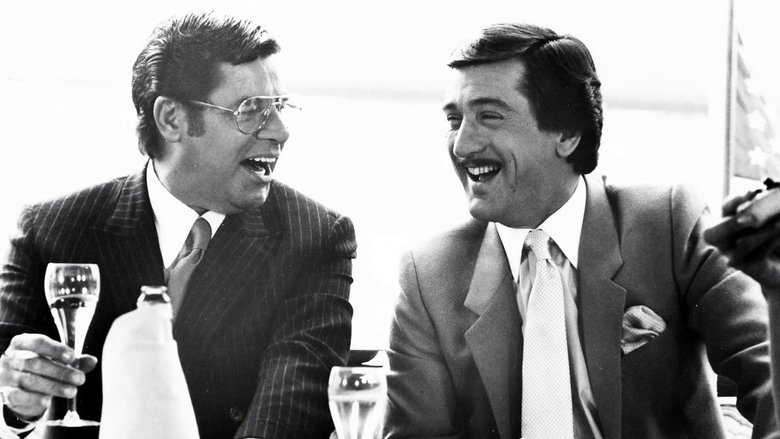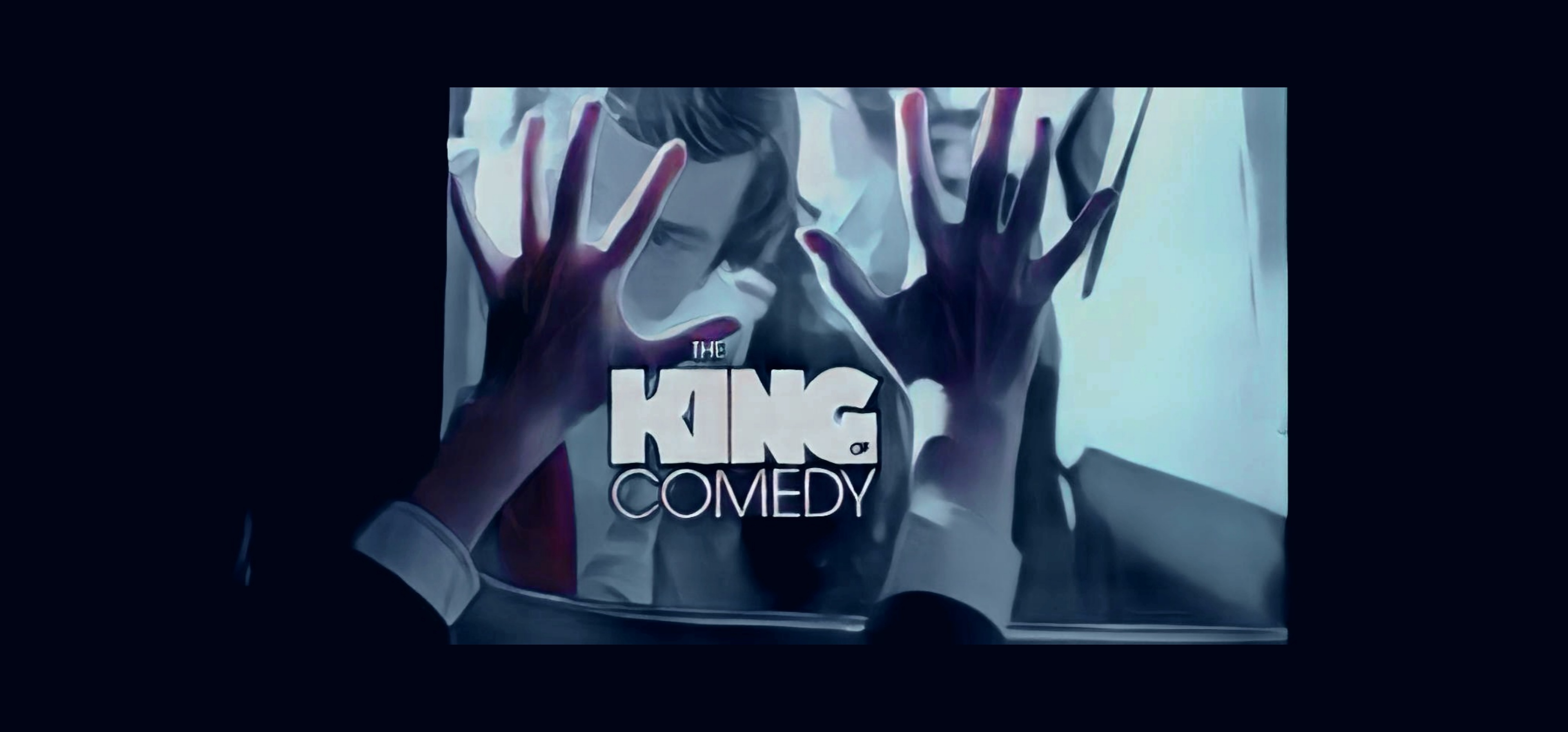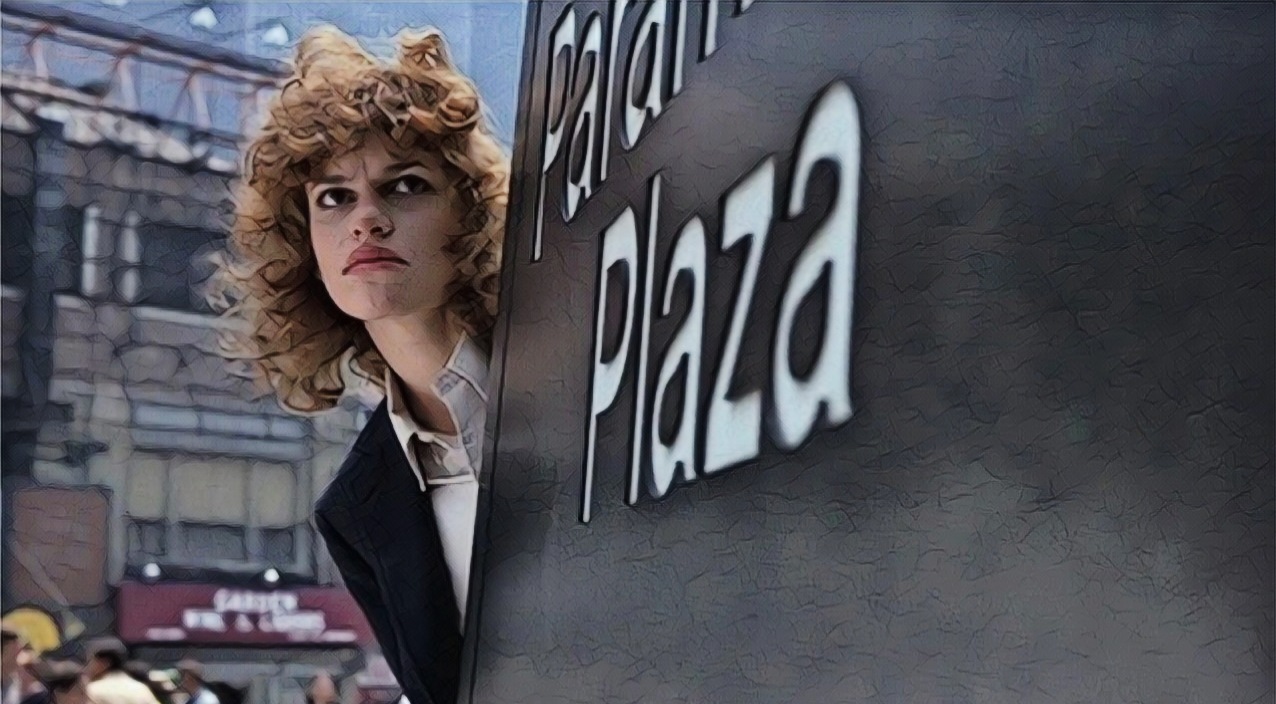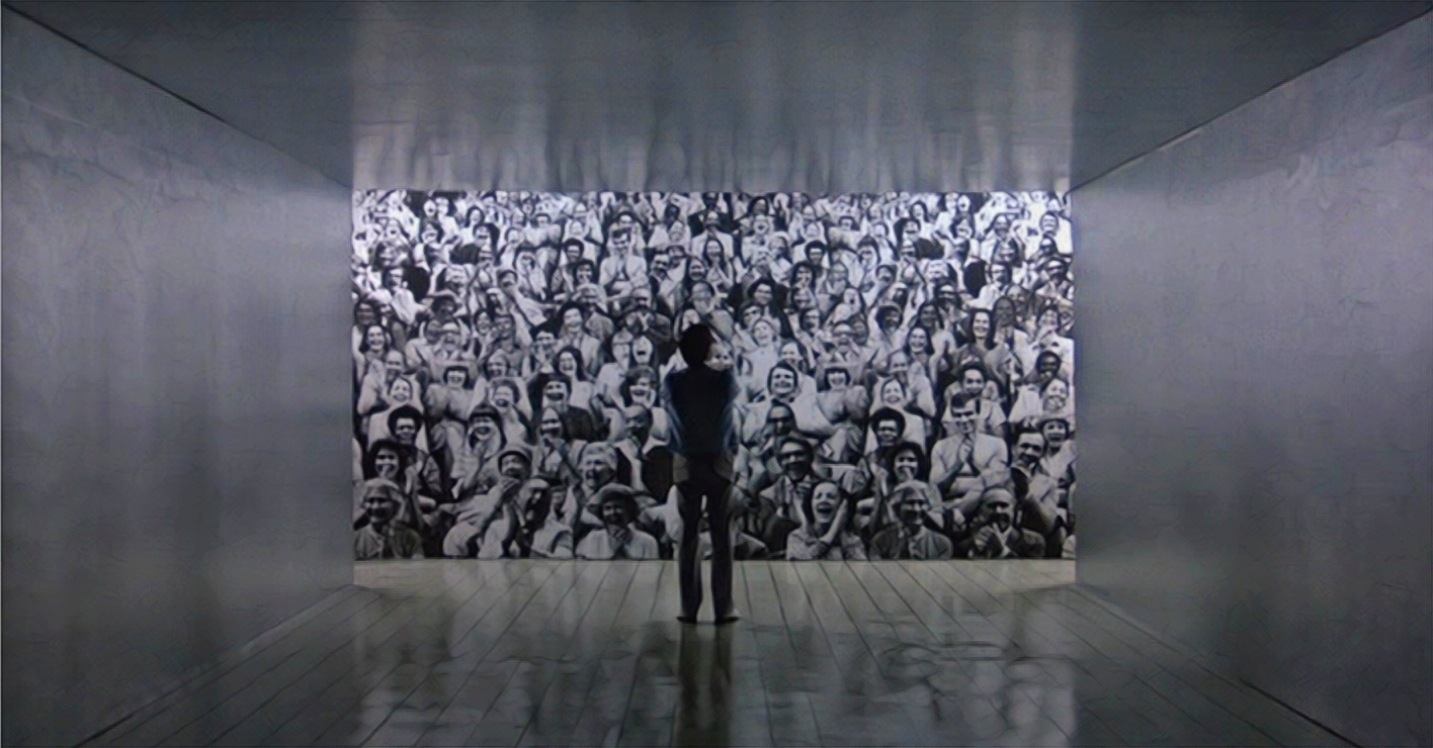← Back to Reviews

in
The King of Comedy was pretty badly trashed by critics and audiences alike upon its release back in 1983. This is one of the many instances where both groups missed the boat.

Perhaps it was sold incorrectly, giving the impression that it was supposed to be a "comedy", which it really isn't - though it certainaly has hysterical moments. But then, so do Taxi Driver and GoodFellas. Maybe Rupert Pupkin was just too bizarre a character, and DeNiro's performance too unfamiliar? And maybe the very topic and tone seemed too far-fetched and surreal at that time? Whatever the reasons, folks were seeing a classic movie unfold before their eyes, but weren't able to process it as such yet.

The King of Comedy is the story of Rupert Pupkin (DeNiro), a sorry would-be stand-up comedian who longs for his big break into the business. He doesn't have the courage or desire to actually play clubs, pay his dues, learn his craft by trial and error. Rather Rupert wants success and fame today, fully-formed, a megastar in one shot. He believes he could achieve this by appearing on "The Jerry Langford Show", a Johnny Carson "Tonight Show"-type program that films in New York City (just as Carson's show did before the move to L.A. in the early '70s). As the movie opens, Rupert creates a chance encounter with Langford, who is played extremely well by Jerry Lewis. He awkwardly fumbles through his wish to be a comedy star, and Jerry actually responds with fairly good advice. It's clear to us he just wants to get rid of this creep, but he also does so in a helpful if measured way. However, rather than shine some reality onto Pupkin's dream, this encounter sends him hurtling further down the path of fantasy and obsession.

What follows is a mixture of fantasy and reality as Rupert's subsequent attempts to interact with Jerry and appear on his show become more and more sad and dangerous, eventually boiling into a kidnapping plot where extortion may be Rupert's passport to television stardom. The rest of the cast includes Diahanne Abbott (DeNiro's real-life wife at the time, and already a smaller supporting player in Taxi Driver and New York, New York) as a girl from High School he always had a crush on and who he involves unwittingly in his schemes, Sandra Bernhard in her first screen role as another obsessed fan of Langford's - though hers is centered on delusional romantic desires and not showbiz ones, and Fred DeCordova (Johnny Carson's real-life producer) as the fictional show's producer. All the performances fit perfectly, including surprisingly good and textured work by Jerry Lewis, in the first real attempt at drama in his mostly clownish career. Scorsese cast and uses him expertly, drawing on his known persona and somehow intuiting he would be able to go toe-to-toe with Bobby DeNiro on screen in dramatic scenes. But this is a really showcase for DeNiro, and with this character he shows another more pathetic side of a Travis Bickle type.

The tone and the mixture of realities is perfectly done by Scorsese and company. The climate in 1983 should have been ripe for this satire, for the social trends that were being explored, but the effort was judged as a failure then. Remember this was only a few years after Mark David Chapman gunned down John Lennon outside his Manhattan apartment, and two years after John Hinkley shot President Reagan in Washington, D.C. - to which the clearly insane and disturbed Hinkley tried to explain by his own obsession with Jodie Foster and Scorsese's Taxi Driver. DeNiro was already a double-Oscar winner by now and a huge and respected movie star, so he understood the darker side of fame quite well. It was DeNiro who was keen on the project initially, in the late '70s, but Scorsese didn't see a way into it for himself. But after Raging Bull and a continued accumulation of fame of his own, Scorsese "got it" and it went into production.
One of the many sticking points for audiences, then and even now, is the ending. Without going into much detail for those who haven't seen it, let me just say that if after watching The King of Comedy your main response is "Was it real or a fatasy?", then you have COMPLETELY missed the entire point of the film. The point is that it could just as easily be either, that in American society as the filmmakers saw it, either was equally likely - which is a scary and sobering conclusion.

It's a movie that is way ahead of its time in many ways. The script was written before celebrity stalking and fame at any price had become as minstream, and even though the film's production was certainly colored by the shootings of Lennon and Reagan and therefore of it's time, reading old reviews and juding by the complete lack of box office interest, it would seem the level of obsession explored in The King of Comedy was deemed too abstract and impossibly silly. In today's climate, it seems quite common and understandable, and like Sidney Lumet's Network (1977), it's an over-the-top satire that has been eclipsed decades later by our bizarre reality.
The King of Comedy is another of Marty's masterworks, but like After Hours too little known (though the presence of DeNiro makes it a little more high profile than the megastar-less After Hours). It was thankfully released on R1 DVD in December of 2002, finally letterboxed (even the old LD was full frame) and with a few extras: unfortunately no audio commentary track this time (Scorsese was much too busy readying Gangs of New York), but it does include two deleted scenes, a brief but good 15-minute new retrosepctive documentary, and the theatrical trailer.
Perhaps it was sold incorrectly, giving the impression that it was supposed to be a "comedy", which it really isn't - though it certainaly has hysterical moments. But then, so do Taxi Driver and GoodFellas. Maybe Rupert Pupkin was just too bizarre a character, and DeNiro's performance too unfamiliar? And maybe the very topic and tone seemed too far-fetched and surreal at that time? Whatever the reasons, folks were seeing a classic movie unfold before their eyes, but weren't able to process it as such yet.
The King of Comedy is the story of Rupert Pupkin (DeNiro), a sorry would-be stand-up comedian who longs for his big break into the business. He doesn't have the courage or desire to actually play clubs, pay his dues, learn his craft by trial and error. Rather Rupert wants success and fame today, fully-formed, a megastar in one shot. He believes he could achieve this by appearing on "The Jerry Langford Show", a Johnny Carson "Tonight Show"-type program that films in New York City (just as Carson's show did before the move to L.A. in the early '70s). As the movie opens, Rupert creates a chance encounter with Langford, who is played extremely well by Jerry Lewis. He awkwardly fumbles through his wish to be a comedy star, and Jerry actually responds with fairly good advice. It's clear to us he just wants to get rid of this creep, but he also does so in a helpful if measured way. However, rather than shine some reality onto Pupkin's dream, this encounter sends him hurtling further down the path of fantasy and obsession.
What follows is a mixture of fantasy and reality as Rupert's subsequent attempts to interact with Jerry and appear on his show become more and more sad and dangerous, eventually boiling into a kidnapping plot where extortion may be Rupert's passport to television stardom. The rest of the cast includes Diahanne Abbott (DeNiro's real-life wife at the time, and already a smaller supporting player in Taxi Driver and New York, New York) as a girl from High School he always had a crush on and who he involves unwittingly in his schemes, Sandra Bernhard in her first screen role as another obsessed fan of Langford's - though hers is centered on delusional romantic desires and not showbiz ones, and Fred DeCordova (Johnny Carson's real-life producer) as the fictional show's producer. All the performances fit perfectly, including surprisingly good and textured work by Jerry Lewis, in the first real attempt at drama in his mostly clownish career. Scorsese cast and uses him expertly, drawing on his known persona and somehow intuiting he would be able to go toe-to-toe with Bobby DeNiro on screen in dramatic scenes. But this is a really showcase for DeNiro, and with this character he shows another more pathetic side of a Travis Bickle type.
The tone and the mixture of realities is perfectly done by Scorsese and company. The climate in 1983 should have been ripe for this satire, for the social trends that were being explored, but the effort was judged as a failure then. Remember this was only a few years after Mark David Chapman gunned down John Lennon outside his Manhattan apartment, and two years after John Hinkley shot President Reagan in Washington, D.C. - to which the clearly insane and disturbed Hinkley tried to explain by his own obsession with Jodie Foster and Scorsese's Taxi Driver. DeNiro was already a double-Oscar winner by now and a huge and respected movie star, so he understood the darker side of fame quite well. It was DeNiro who was keen on the project initially, in the late '70s, but Scorsese didn't see a way into it for himself. But after Raging Bull and a continued accumulation of fame of his own, Scorsese "got it" and it went into production.
One of the many sticking points for audiences, then and even now, is the ending. Without going into much detail for those who haven't seen it, let me just say that if after watching The King of Comedy your main response is "Was it real or a fatasy?", then you have COMPLETELY missed the entire point of the film. The point is that it could just as easily be either, that in American society as the filmmakers saw it, either was equally likely - which is a scary and sobering conclusion.
It's a movie that is way ahead of its time in many ways. The script was written before celebrity stalking and fame at any price had become as minstream, and even though the film's production was certainly colored by the shootings of Lennon and Reagan and therefore of it's time, reading old reviews and juding by the complete lack of box office interest, it would seem the level of obsession explored in The King of Comedy was deemed too abstract and impossibly silly. In today's climate, it seems quite common and understandable, and like Sidney Lumet's Network (1977), it's an over-the-top satire that has been eclipsed decades later by our bizarre reality.
The King of Comedy is another of Marty's masterworks, but like After Hours too little known (though the presence of DeNiro makes it a little more high profile than the megastar-less After Hours). It was thankfully released on R1 DVD in December of 2002, finally letterboxed (even the old LD was full frame) and with a few extras: unfortunately no audio commentary track this time (Scorsese was much too busy readying Gangs of New York), but it does include two deleted scenes, a brief but good 15-minute new retrosepctive documentary, and the theatrical trailer.
